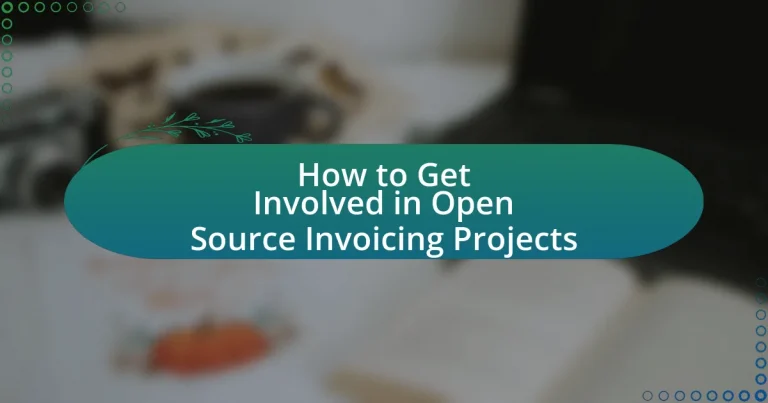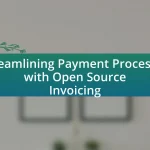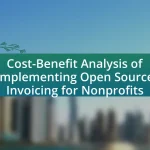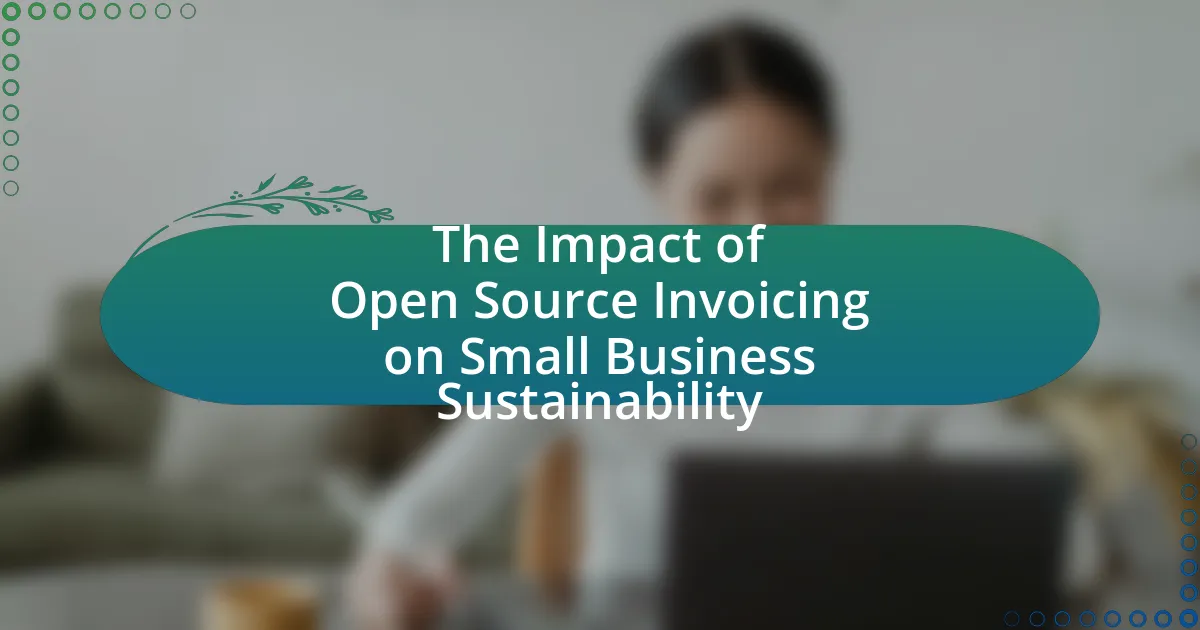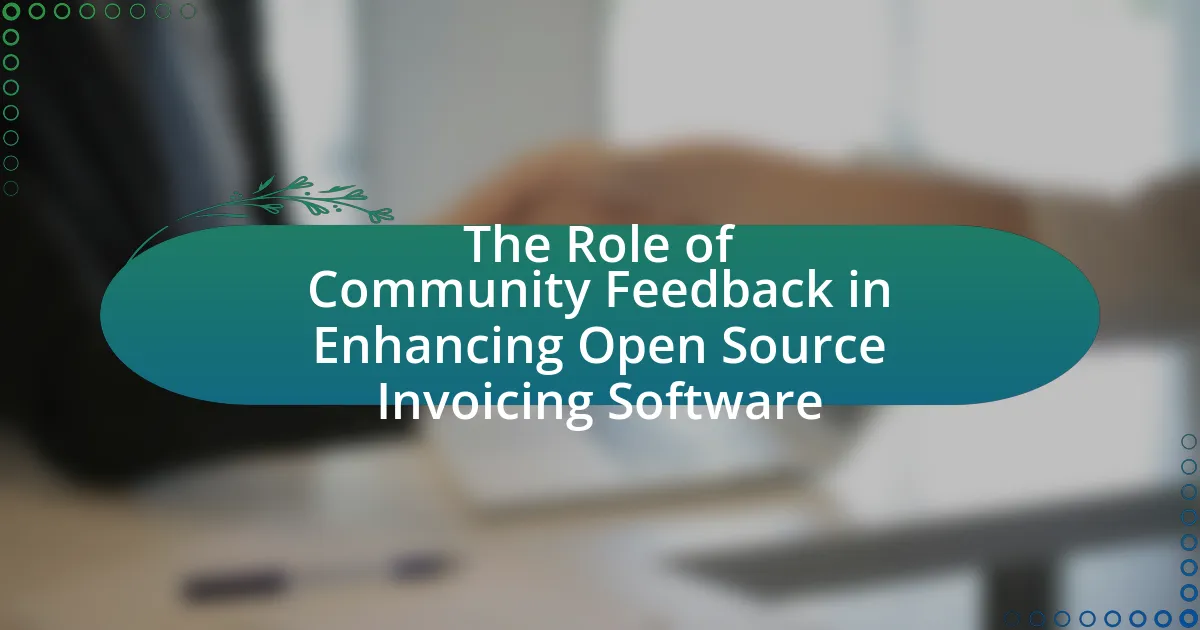Open Source Invoicing Projects are software applications that enable users to create, manage, and send invoices while allowing access to their source code for modification and distribution. This article outlines the functionality, key features, and benefits of these projects, highlighting their collaborative nature compared to proprietary software. It also discusses how individuals can get involved, the skills required for effective contribution, and the resources available for enhancing skills and staying updated on project developments. Additionally, it addresses common challenges faced by contributors and strategies for overcoming them, emphasizing the importance of community engagement and networking in the open source ecosystem.
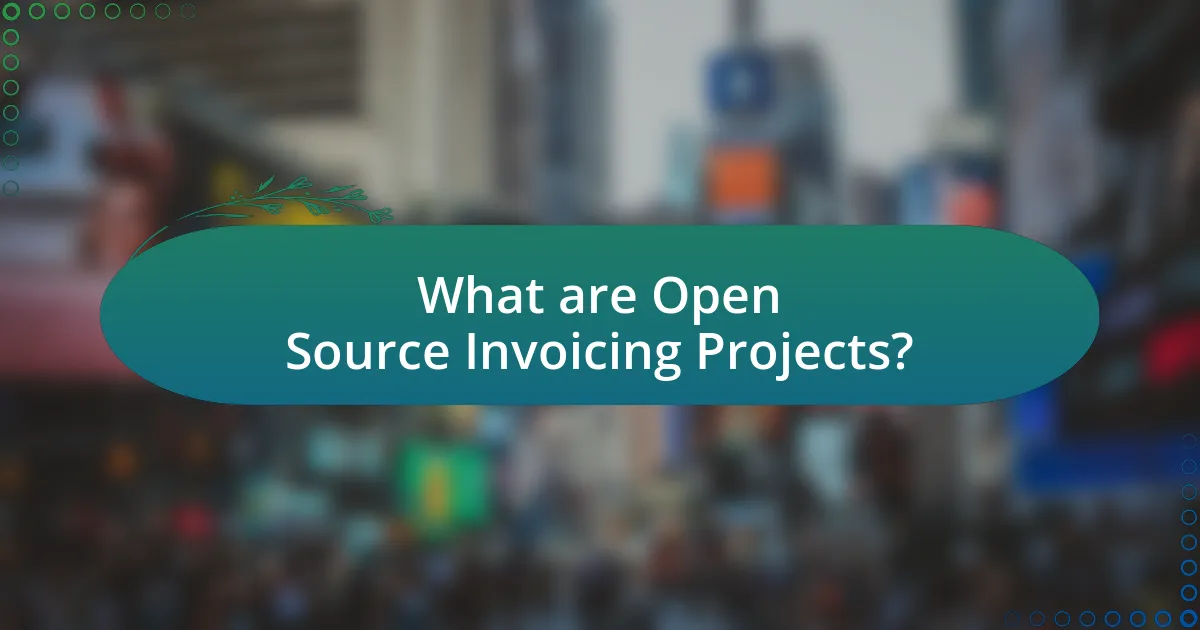
What are Open Source Invoicing Projects?
Open Source Invoicing Projects are software applications that allow users to create, manage, and send invoices while providing access to their source code for modification and distribution. These projects promote collaboration and transparency, enabling developers and businesses to customize invoicing solutions to meet specific needs. Examples include Invoice Ninja and Dolibarr, which are widely used and supported by active communities, demonstrating the viability and effectiveness of open-source solutions in the invoicing domain.
How do Open Source Invoicing Projects function?
Open Source Invoicing Projects function by allowing users to access, modify, and distribute the software’s source code freely. These projects typically operate under licenses that promote collaboration and transparency, enabling developers to contribute features, fix bugs, and enhance usability. For instance, platforms like Invoice Ninja and Dolibarr provide community-driven development, where contributions from users lead to continuous improvement and innovation. This collaborative model not only fosters a diverse range of functionalities but also ensures that the software remains adaptable to various user needs, as evidenced by the growing number of contributors and forks in popular open source invoicing repositories on platforms like GitHub.
What are the key features of Open Source Invoicing Projects?
Open Source Invoicing Projects typically feature customizable templates, allowing users to tailor invoices to their branding needs. These projects often include multi-currency support, enabling businesses to invoice clients in various currencies, which is essential for international transactions. Additionally, they provide integration capabilities with other software, such as accounting systems and payment gateways, enhancing workflow efficiency. User-friendly interfaces are common, making it easier for non-technical users to navigate and utilize the software effectively. Furthermore, community support is a significant aspect, as users can contribute to the project, report issues, and suggest improvements, fostering a collaborative environment. These features collectively enhance usability, flexibility, and community engagement in open source invoicing solutions.
How do these projects differ from proprietary invoicing software?
Open source invoicing projects differ from proprietary invoicing software primarily in their accessibility and collaborative nature. Open source projects allow users to view, modify, and distribute the source code, fostering community-driven development and innovation. In contrast, proprietary software restricts access to the source code, limiting user customization and collaboration. For example, according to the Open Source Initiative, open source software promotes transparency and user empowerment, which contrasts sharply with the closed ecosystems of proprietary solutions that often require licensing fees and impose usage restrictions.
Why should you get involved in Open Source Invoicing Projects?
Getting involved in Open Source Invoicing Projects enhances your skills and contributes to community-driven software development. Participation in these projects allows individuals to collaborate with diverse developers, gaining practical experience in coding, project management, and problem-solving. According to the 2021 Open Source Survey by GitHub, 90% of developers believe that contributing to open source improves their coding skills and increases job opportunities. Engaging in these projects also fosters innovation, as open source solutions often lead to more flexible and customizable invoicing systems that can adapt to various business needs.
What benefits do contributors gain from participating?
Contributors gain several benefits from participating in open source invoicing projects, including skill development, networking opportunities, and potential career advancement. By engaging in these projects, contributors enhance their technical skills through practical experience and collaboration with other developers. Additionally, they build a professional network, which can lead to job opportunities and collaborations in the future. According to a 2021 survey by GitHub, 90% of developers reported that contributing to open source improved their job prospects, highlighting the tangible career benefits of participation.
How do Open Source Invoicing Projects impact the community?
Open Source Invoicing Projects significantly impact the community by fostering collaboration, enhancing transparency, and reducing costs for users. These projects allow developers and users to contribute to and modify invoicing software, which leads to continuous improvement and innovation. For instance, according to a 2021 study by the Open Source Initiative, communities around open source projects often report increased user engagement and satisfaction due to the ability to customize solutions to meet specific needs. Additionally, open source invoicing tools eliminate licensing fees, making them accessible to small businesses and freelancers, thereby promoting economic inclusivity.
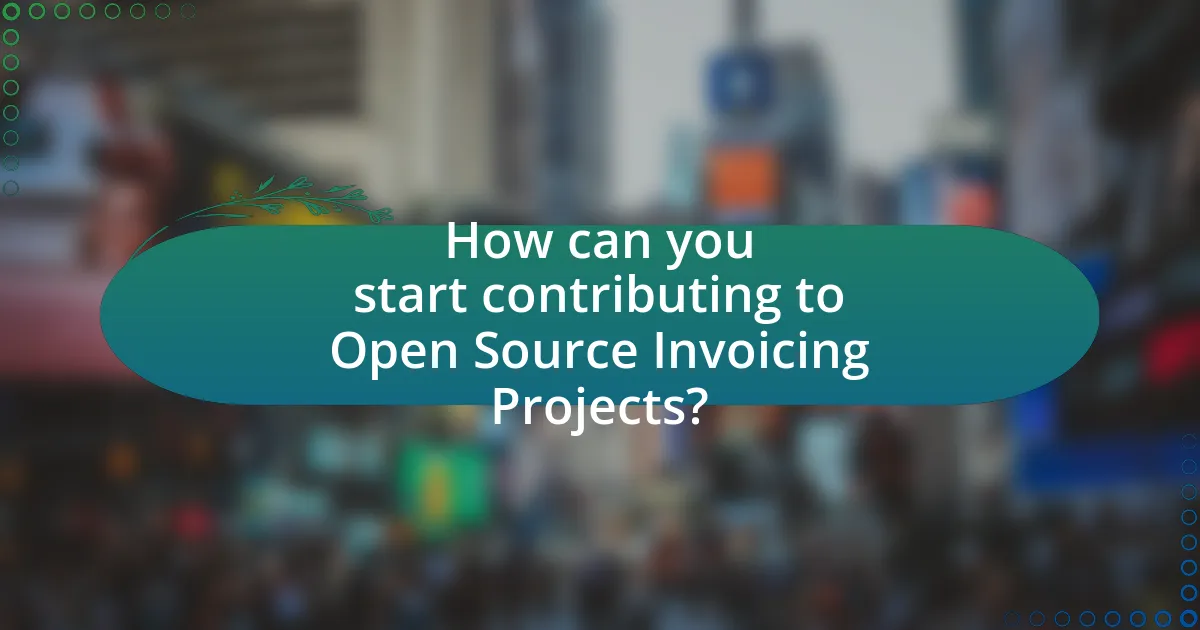
How can you start contributing to Open Source Invoicing Projects?
To start contributing to Open Source Invoicing Projects, first identify a project that aligns with your skills and interests, such as Invoice Ninja or Dolibarr. Once you select a project, familiarize yourself with its codebase by reviewing documentation and existing issues on platforms like GitHub. Engaging with the community through forums or chat channels can provide insights and guidance. Additionally, begin by addressing smaller issues or bugs to build your confidence and understanding of the project. According to GitHub’s 2021 Octoverse report, 83% of developers contribute to open source to improve their skills, highlighting the value of practical experience in these projects.
What skills are needed to contribute effectively?
To contribute effectively to open source invoicing projects, individuals need strong programming skills, particularly in languages relevant to the project, such as JavaScript, Python, or Ruby. Proficiency in version control systems like Git is essential for collaboration and managing code changes. Additionally, understanding software development methodologies, such as Agile, enhances teamwork and project management. Familiarity with invoicing concepts and financial regulations can also improve contributions, ensuring that the software meets user needs and compliance standards. These skills are validated by the fact that successful open source contributors often possess a blend of technical expertise and domain knowledge, which facilitates meaningful participation in projects.
How can you assess your current skill level for contribution?
To assess your current skill level for contribution, conduct a self-evaluation based on your knowledge, experience, and the specific requirements of open source invoicing projects. Start by reviewing the technical skills needed for these projects, such as programming languages, software development methodologies, and version control systems. Then, compare your existing skills against these requirements using online resources like coding challenge platforms or open source project documentation.
For instance, if a project requires proficiency in Python and you have completed several Python courses and built personal projects, this indicates a solid foundation. Additionally, participating in community forums or contributing to smaller projects can provide feedback on your skills and areas for improvement. This methodical approach allows you to gauge your readiness for meaningful contributions effectively.
What resources are available to improve your skills?
To improve your skills in open source invoicing projects, utilize online platforms such as GitHub, where you can access numerous repositories and contribute to existing projects. Additionally, websites like Codecademy and Coursera offer courses specifically focused on programming languages and tools commonly used in open source development, such as Python and JavaScript. Engaging with communities on forums like Stack Overflow and Reddit can provide practical insights and peer support. Furthermore, attending workshops and webinars hosted by organizations like the Open Source Initiative can enhance your understanding and networking opportunities within the open source ecosystem.
Where can you find Open Source Invoicing Projects to contribute to?
You can find Open Source Invoicing Projects to contribute to on platforms like GitHub, GitLab, and SourceForge. These platforms host numerous repositories where developers share their invoicing software projects, allowing contributors to collaborate and improve the codebase. For instance, GitHub alone has thousands of repositories tagged with “invoicing” or “billing,” making it a prime location for finding projects that welcome contributions.
What platforms host Open Source Invoicing Projects?
Open source invoicing projects are primarily hosted on platforms such as GitHub, GitLab, and SourceForge. GitHub is the most widely used platform, hosting millions of repositories, including numerous invoicing solutions like Invoice Ninja and Dolibarr. GitLab offers similar functionalities and is favored for its integrated CI/CD features, while SourceForge provides a repository for various open source projects, including invoicing software. These platforms facilitate collaboration, version control, and community engagement, making them essential for developers and users interested in open source invoicing solutions.
How can you identify active projects that need contributors?
To identify active projects that need contributors, search for repositories on platforms like GitHub that have recent commits, open issues, and a clear call for contributions. Active projects typically show consistent activity, such as recent updates or discussions, indicating ongoing development. For example, repositories with a high number of open issues and labeled “help wanted” or “good first issue” signal a need for contributors. Additionally, community forums and social media groups related to open source can provide insights into projects seeking help, as they often share opportunities for collaboration.

What are the best practices for contributing to Open Source Invoicing Projects?
The best practices for contributing to Open Source Invoicing Projects include understanding the project’s guidelines, actively engaging with the community, and submitting high-quality code. Familiarizing oneself with the project’s documentation ensures compliance with coding standards and contribution protocols. Engaging with the community through forums or chat platforms fosters collaboration and helps clarify any uncertainties. Submitting high-quality code involves thorough testing and adherence to best coding practices, which enhances the project’s reliability and maintainability. These practices are supported by the fact that successful open-source projects often have clear contribution guidelines and active community engagement, which leads to higher-quality contributions and project sustainability.
How should you approach your first contribution?
To approach your first contribution, start by selecting a project that aligns with your skills and interests. Research the project’s documentation and contribution guidelines thoroughly to understand its structure and requirements. Engaging with the community through forums or chat channels can provide insights and support. Begin with small tasks, such as fixing bugs or improving documentation, to familiarize yourself with the codebase and build confidence. This method is effective as it allows for gradual learning and integration into the project, which is crucial for new contributors.
What steps should you take to ensure a successful contribution?
To ensure a successful contribution to open source invoicing projects, you should first familiarize yourself with the project’s guidelines and code of conduct. Understanding these documents helps align your contributions with the project’s goals and community standards. Next, actively engage with the community by participating in discussions, asking questions, and seeking feedback on your contributions. This interaction fosters collaboration and enhances the quality of your work. Additionally, thoroughly test your code and ensure it adheres to the project’s coding standards before submitting a pull request. This practice minimizes errors and increases the likelihood of your contribution being accepted. Finally, be open to constructive criticism and willing to make revisions based on feedback, as this demonstrates your commitment to the project’s success and helps build a positive reputation within the community.
How can you effectively communicate with project maintainers?
To effectively communicate with project maintainers, use clear and concise language in your messages. This approach ensures that your inquiries or suggestions are easily understood and addressed. Additionally, familiarize yourself with the project’s communication channels, such as mailing lists, issue trackers, or chat platforms, to engage appropriately. Research shows that maintainers appreciate well-structured communication, as it saves time and fosters productive discussions. For instance, a study by the Open Source Initiative highlights that clear communication significantly enhances collaboration and project success rates.
What common challenges might you face when contributing?
Common challenges when contributing to open source invoicing projects include navigating complex codebases, understanding project documentation, and managing communication with other contributors. Contributors often face difficulties in comprehending the intricacies of existing code, which can be extensive and poorly documented. For instance, a study by GitHub in 2020 revealed that 70% of contributors reported challenges related to documentation clarity. Additionally, effective communication is crucial, as contributors must collaborate with diverse teams, which can lead to misunderstandings or conflicts. These challenges can hinder the contribution process and may discourage potential contributors from participating.
How can you overcome technical challenges in Open Source Projects?
To overcome technical challenges in Open Source Projects, actively engage with the community and utilize available resources. Engaging with the community allows for collaboration, where experienced contributors can provide guidance and solutions to specific issues. Utilizing resources such as documentation, forums, and issue trackers can help identify common problems and their resolutions. For instance, a study by the Open Source Initiative found that 70% of contributors reported that community support significantly aided their problem-solving efforts. This demonstrates that leveraging community knowledge and resources is essential for effectively addressing technical challenges in open source projects.
What strategies can help you deal with feedback and criticism?
To effectively deal with feedback and criticism, actively listen to the feedback, reflect on it, and respond constructively. Active listening involves fully concentrating on the feedback being given, which helps in understanding the perspective of the critic. Reflecting on the feedback allows individuals to assess its validity and relevance to their work. Responding constructively means addressing the feedback positively, whether by making necessary adjustments or seeking clarification if needed. Research indicates that individuals who adopt a growth mindset, which embraces feedback as an opportunity for improvement, tend to perform better in collaborative environments, such as open source projects.
What tips can enhance your experience in Open Source Invoicing Projects?
To enhance your experience in Open Source Invoicing Projects, actively contribute by engaging with the community, understanding the project’s codebase, and utilizing version control systems effectively. Engaging with the community through forums and discussions fosters collaboration and knowledge sharing, which is essential for growth. Understanding the project’s codebase allows for more meaningful contributions, as familiarity with the structure and functionality leads to better quality code. Utilizing version control systems, such as Git, ensures that contributions are tracked and managed efficiently, facilitating smoother collaboration and integration of changes. These practices are supported by the collaborative nature of open source, where community involvement and technical proficiency significantly improve project outcomes.
How can networking with other contributors benefit you?
Networking with other contributors can significantly enhance your skills and opportunities in open source invoicing projects. By connecting with experienced contributors, you gain access to valuable insights, mentorship, and collaborative opportunities that can accelerate your learning and project contributions. Research indicates that 70% of jobs are found through networking, highlighting its importance in career advancement. Additionally, collaboration often leads to improved problem-solving and innovation, as diverse perspectives can generate more effective solutions. Engaging with a community of contributors fosters a supportive environment that encourages knowledge sharing and skill development, ultimately benefiting your contributions to open source projects.
What resources can help you stay updated on project developments?
To stay updated on project developments in open source invoicing projects, utilize platforms such as GitHub, mailing lists, and community forums. GitHub provides real-time updates on code changes, issues, and discussions, making it a primary resource for tracking project progress. Mailing lists often share announcements and updates directly from project maintainers, while community forums facilitate discussions and insights from other contributors. These resources collectively ensure that you remain informed about the latest developments and community activities related to the projects.
